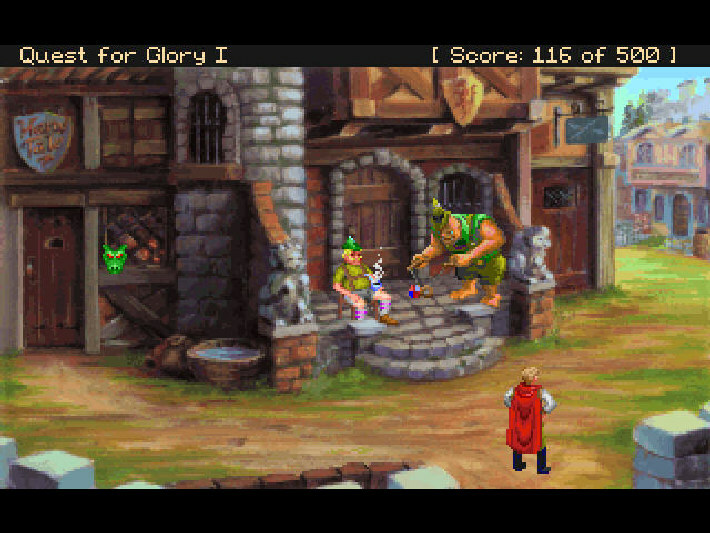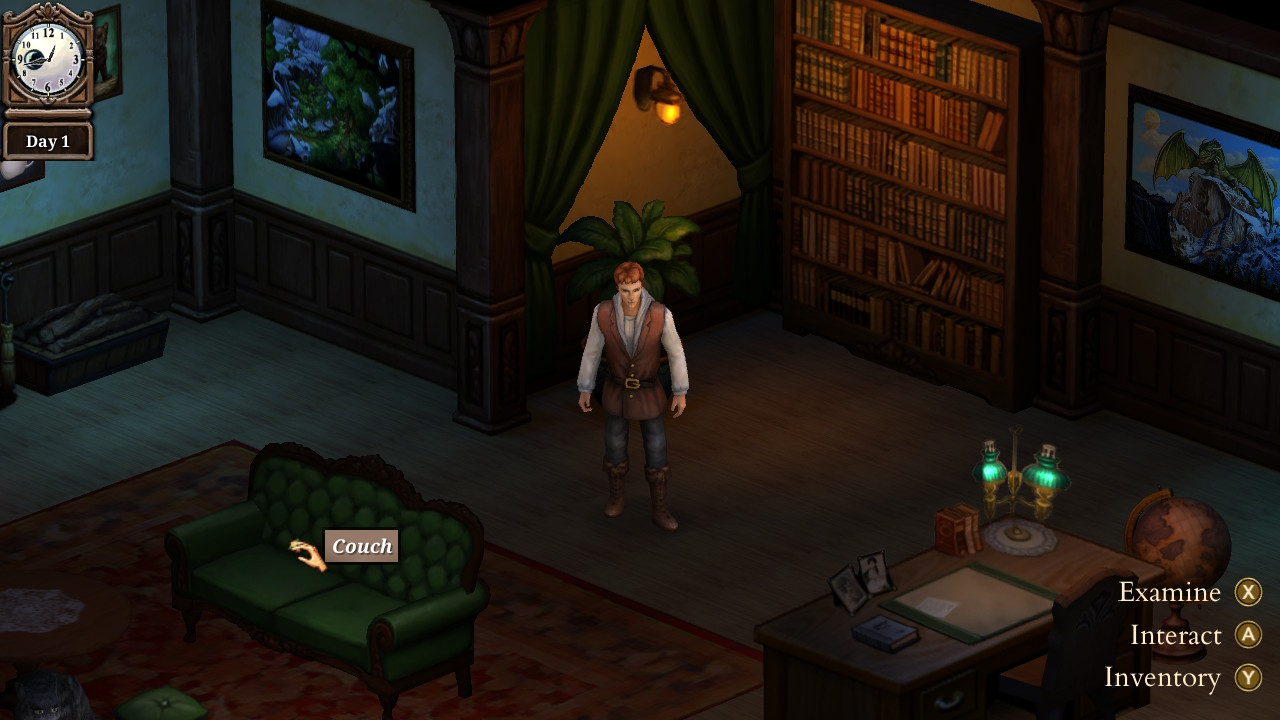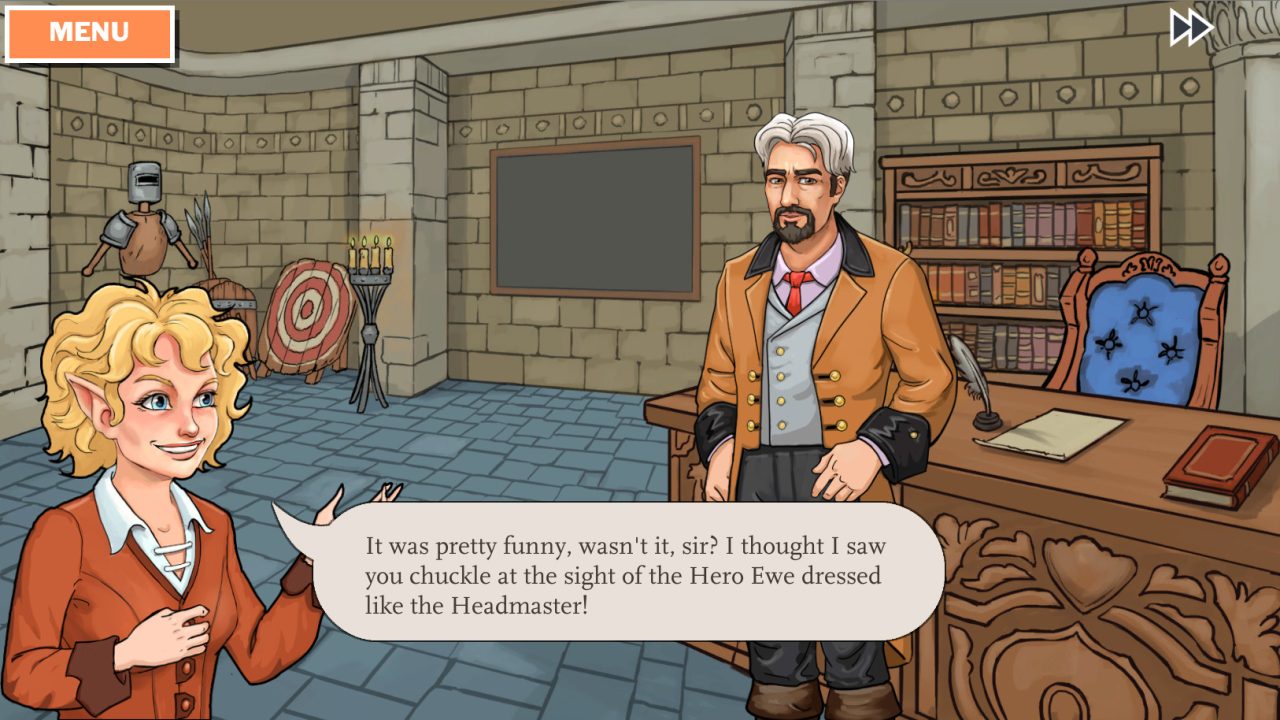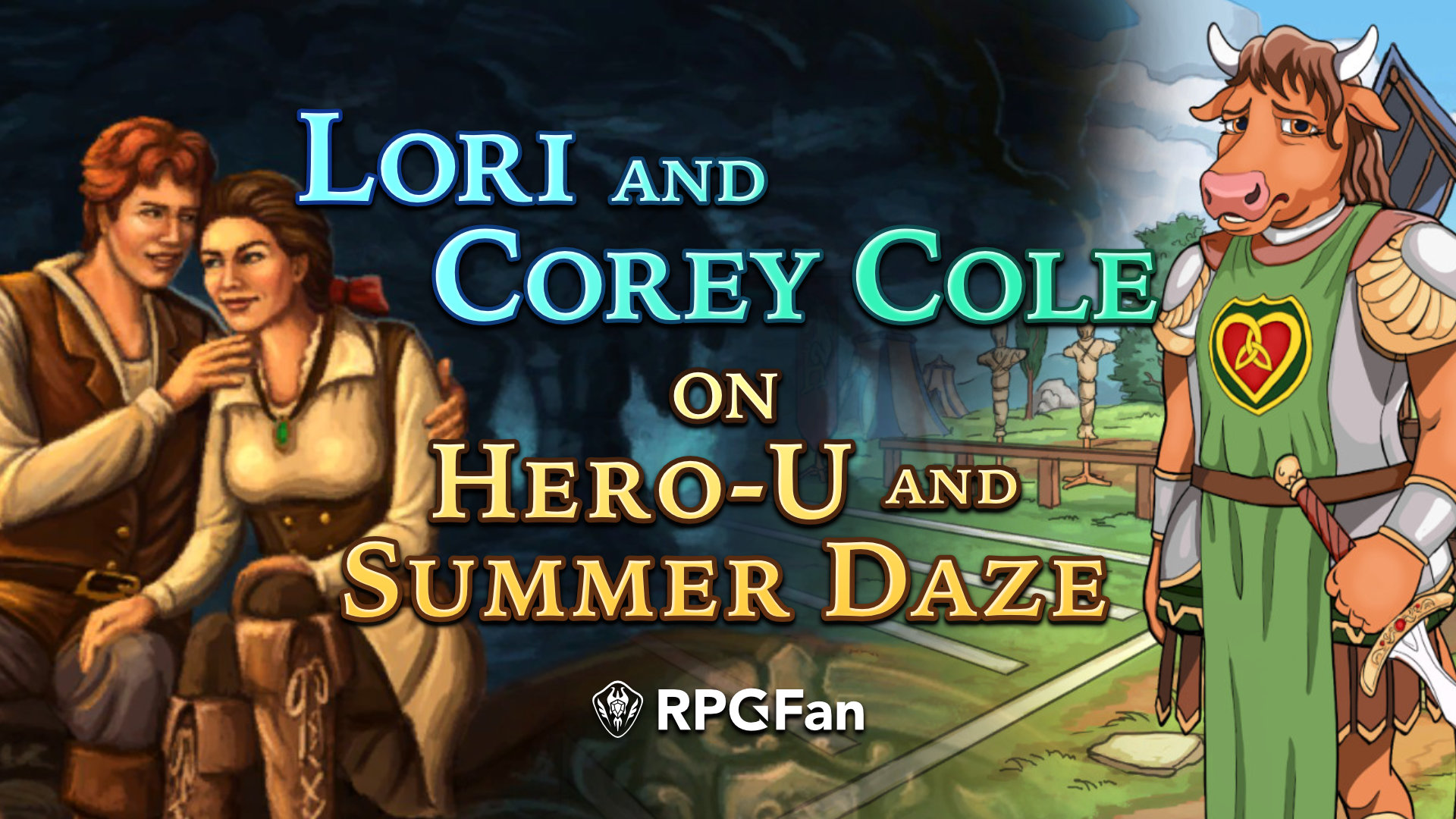Long ago, there was a beloved adventure game series called Quest for Glory, the product of husband and wife team Lori and Corey Cole. It was incredibly fun and took stat boosting and class mechanics from tabletop RPGs and blended them with point-and-click exploration and action RPG combat long before others were melding those ideas. More recently, the pair continued to innovate with the release of Hero-U: Rogue to Redemption, which I had the privilege of reviewing. It’s a truly uplifting feeling to see these legacy creators at work again and continuing to genre-mash with visual novel and more traditional RPG elements. After this ambitious first effort, they’re working on a visual novel game set in that world called Summer Daze: Tilly’s Tale. We caught up with the Coles and asked about their modern and recent creations, along with their process and side projects. Not sure whether this interview will raise your Smarts, Charm, or Moxie, but most RPGFans are likely to get something out of it. Enjoy!
RPGFan: We heard the original Quest for Glory series had a sort of grand plan where each title had an elemental affinity, a mood/theme that helped drive that part of the story. Is there anything like that for Hero-U?
Coles: Hero-U is planned as a five-game series, the first four each featuring a different hero class, and the final game allowing you to play all your characters in different parts of the story. They are all set at the Hero University.
We originally thought that all of the games would be parallel in the same school year, but decided that it will be better to have a progression. The stakes and problems the hero needs to solve become more dangerous and intense through the games. Actions the hero might take in the first games have repercussions that affect the later ones. We considered having a “character save” as in Quest for Glory, but it wouldn’t make much sense, as players are likely to play each game multiple times, with different ending states.
RPGFan: We talked briefly about the Quest for Glory series and its placement in the Bitmap Books releases in e-mail. The series has always been a bit of a hybrid RPG-graphic adventure, but the conversation made us curious:
Can you tell us a bit about your creative process with that genre-blending, and where would you place it as far as game type?
Coles: Our experiences playing tabletop RPGs were mostly in games with storytelling and puzzle-oriented game masters. Combat was important in them, but there were always story elements framing the play.
Ken Williams originally hired us at Sierra with the idea that we would make an RPG similar to Ultima. But my first job involved converting Sierra’s SCI game engine to work on the Atari ST. In that process, I learned that SCI was terrific for interaction and storytelling but not great for map-based exploration or RPG combat.
Rather than reinventing the engine, we proposed a game series that would play to Sierra’s strengths. Instead of abstract games like Ultima, Hero’s Quest (the original name for Quest for Glory) would focus on story, characters, and a more intimate point of view. This also played to Lori’s strengths as an artist, teacher, and storyteller. I used my systems programming experience to add an RPG layer on top of SCI’s adventure game systems. The result was a game that looked like a Sierra adventure game, but also featured RPG stats, character growth, and combat.
My view on RPGs and adventure games is that both were inspired by tabletop RPGs, but early computers didn’t have enough memory, disk space, or processing speed to handle everything that happened in a great tabletop game. In the late 1980s, most home computers had hard drives, and eventually CD-ROM and DVD drives, so we could start bringing the genres together as we always felt they were meant to be.
RPGFan: Why would Quest for Glory (QfG), of all the long-running graphic adventure series, be suitable for RPGFan readers to try? And which game would you recommend most for them?
Coles: Quest for Glory is all about being immersed in a game world full of adventure, humor, story, and heart. Even to this day, it’s hard to find a game that draws you so deeply into a world full of mystery, magic, and wonder — and can make you laugh.
I recommend starting at the beginning of the series — either the original typed-input Quest for Glory: So You Want To Be A Hero from 1989 or the point-and-click remake from 1992. There are fans that prefer each version. The original game is more challenging, requiring you to follow the story to type appropriate questions and commands. The graphics are better in the remake, and the interface is more forgiving.
Our most popular game in the series is Quest for Glory IV: Shadows of Darkness. This and the fifth game are the only ones with voice acting. It’s also moody, with a Transylvania setting, a complex story, and many puzzles to solve. It’s a challenging game that requires keeping track of story clues.

RPGFan: The QfG series is full of exciting and diverse settings. Which was your favorite to design and research?
Coles: We had a fun and challenging time with every game. Each has a unique setting and culture, which we enjoyed researching in books and films. Quest for Glory II, with its “Arabian Nights” feel, and technical innovations in the alleyways and desert, was particularly fun and challenging to create. Quest for Glory IV really let us play with the tropes of “comedy horror.”
We pulled ideas for each game from life experiences and from our favorite books and films. QfG2 pulled from Casablanca, Lawrence of Arabia, and Persian mythology. QG4 was inspired by Young Frankenstein, The Raven, Dracula, and more. Lori got reference books and language dictionaries for each game to draw the cultures accurately.
RPGFan: Hero-U: Rogue to Redemption drew some odd comparisons for me to Persona 5. Both star roguish protagonists and have a group of Phantom Thieves/Disbarred Bards working around a system that doesn’t favor them. Both involve a complex time mechanic where you go to school and have a set amount of free time per day to perform actions with other characters and improve skills. First, do you happen to be familiar with Persona? Second, what made you start this new round of stories in the QfG-verse with the Rogue class?
Coles: Our only video game consoles were a Sega Genesis and a Super Nintendo, so we didn’t play much Persona. Our son introduced us to the series, and Lori played an hour or so of Persona 3. We didn’t intentionally create Hero-U as a “Western Persona,” but there are common elements.
We decided that we wanted to treat time as a form of currency. In the best RPGs, players always feel a little starved for enough money to buy the best equipment. In Hero-U, the challenge is to make good use of limited time (as well as money). Shawn has classes during the day, set mealtimes, and needs some sleep at night. Most of his adventuring takes place in the evening hours. We intended to provide enough content for multiple playthroughs.
We originally planned to feature a female Wizard as the player character. But we had some considerations: Would the press dismiss the game as a Harry Potter clone? Would more players prefer a male avatar? If we made a game with a rogue character, could we attract players of Roguelike games? In hindsight, I think those were silly considerations, and we could have kept the original game plan.
We still want to make the Wizard game but don’t have a good way to fund a game as large as Hero-U: Rogue to Redemption. That’s why we’re currently focusing our efforts on games that play more like visual novels. With fixed sets and minimal animation, we’ve been able to keep our development budget slightly more reasonable.
RPGFan: What’s next for the mainline Hero-U games? Rogue to Redemption does an excellent job setting up Warrior, Paladin, Mage, and…Disbarred Bard tracks at the school, so can we hope for four games?
Coles: With unlimited (or at least sufficient) time and budget, we could make many class-based games. Our game plan has been Rogue, Wizard, Warrior, Paladin, and multi-class (switching between the earlier characters). But we could also slip in Chef, Scientist, Bard, and Archer classes, among other possibilities, if the series continues.
Lori has worked out character personalities and story arcs for each of the first four games. The stakes get more intense each time — Shawn is mostly concerned about himself, the Wizard is involved in political machinations, the Warrior has to try to save the school, and the Paladin to overcome a major disaster and deadly enemies. Finally, all the characters are needed to set things right.

RPGFan: One of the new features in Hero-U over other entries in the series is the ability to find and equip weapons and armor. Some of it ends up being silly. What’s your favorite in-game outfit, and would the other students say you look like a “silly clown”? (Silly Clowns is an input you can use in the old QfG to potentially get a bunch of silly jokes and events in the game)
Coles: Armor and weapon upgrades are a hallmark of role-playing games. We had few choices in Quest for Glory because of the very tight memory and disk space restrictions in the 1990s. Since Hero-U runs under Unity and is designed for modern computers, we no longer have those restrictions.
Or, I should say, we have fewer restrictions. Many choices of armor and weapons are fine, but as a small indie company with a limited budget, we can’t show them equipped on Shawn’s 3D model. We compromised by allowing players to view them in a “paper doll” interface similar to those in Ultima Underworld, Diablo, and other RPGs.
As Lori and I determined which items to make available, and what advantages and weaknesses each would have, we also tried to come up with names and descriptions that were both meaningful and fun.
Some of those items are strictly for role-playing (in the storytelling sense), such as the school uniform. Hero-U: Rogue to Redemption tells the story about Shawn’s growth from a street kid to a rogue hero, and we wanted to reflect that in his clothing. As he becomes a little more respectable, he gets to dress the part.
Other items increase Shawn’s fighting ability. One decision we made with this game is that players can choose to avoid fighting entirely through stealth and by avoiding dangerous areas. This was a request from a German adventure game site, and we decided that it would be a cool, if very challenging to create, addition to the game.
I thought about the “gear grind” in games such as World of Warcraft and Star Wars: The Old Republic. My epiphany is that it’s only necessary to get better gear if you intend to fight more dangerous opponents. That means players taking the stealthy, non-combat approach don’t need advanced combat gear. That let us hide most of the combat-oriented equipment behind other combats. So what if you can’t get the Inferno Blade if you’re taking a path through the game that means you won’t need it?
As for the Protection from Panda gear, that started as one of us getting silly during a gear design discussion. This happens frequently with us: usually Corey ruining the mood when Lori is trying to be serious. I think we came up with the Pandana first. Lori decided if we had one Panda item we should have several. This goes along with the comedy theory that a single gag is, at best, mildly amusing, but repeating it several times can make it feel hilarious.
Once we had the Pandana, Pandora, Pand Guards, and Panda Pants, Lori came up with a reason they matter in the game. The Zombie Pirate Captain is terrified of Giant Pandas and will refrain from killing Shawn immediately if he brings the Captain a piece of Panda Protection clothing.
We had Eric Varnes make the panda items silly. If Shawn wears them in school, occasionally another character will comment on him dressing poorly. They also have a mixture of advantages and disadvantages. The Pand Guards are so bulky it’s almost impossible to pick locks while wearing them.
We also created dozens of useful magic items to bring Hero-U closer to other CRPGs. Quest for Glory was a hybrid game, but more casual on the combat and equipment elements. As Lori and I both prefer playing RPGs than adventure games, we wanted to make sure we would enjoy playing our own games!

RPGFan: There’s a major decision near the end of Rogue to Redemption around fighting a boss or bribing them and their kind to leave the school. Will that decision factor into future Hero-U games, sort of like how you could carry over your save data between the older QfG games?
Coles: Our original idea was that actions in Rogue to Redemption would affect future Hero-U games. However, we realized that we had created a game that players can replay multiple times, making different decisions along the way. Which decisions would be canon if they play the game as intended? In fact, as in Wizardry IV, players might well save the game near the end just to try each of the possible endings.
We’ll probably pick a likely player choice instead and do future storytelling based on that assumption. For example, many players will choose to bargain with the Queen Drat instead of killing her. In the process, they will give her a powerful magical amulet that will make her a major “player” after she leaves the University. If we assume that path was chosen, her influence will probably be felt in later games.
It’s challenging to do a completely different branch in a future game depending on the player’s decision as Shawn, given that we would have to write every variation of the story. For practical reasons, we’ll likely pick the most interesting path and leave the others for fanfic or out-of-game stories.
Read more in Part 2 of our interview with the Coles!



